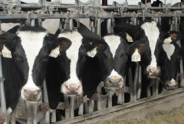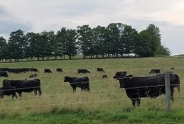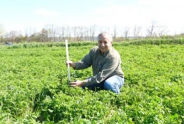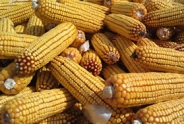Changing Hybrid Maturity Given a Later Planting Date - May 16, 2011
Kevin Ganoe, Area Field Crop Specialist
Central New York Dairy and Field Crops
May 9, 2014
From Dr. William J. Cox, Department of Crop and Soil Science, Cornell University:
I have received quite a few phone calls this morning (May 16, 2011) on keeping or staying with corn hybrid relative maturity (RM) groups, given the forecast for the remainder of the week. So I will venture out and make some comments. Two things to keep in mind:
If hybrids are planted later than normal, they require less growing degree days (GDD) to finish up or mature. For example, a 105 day RM hybrid planted on June 1 instead of May 1 would require only 2100-2150 GDD to be ready for silage harvest instead of the typical 2200 GDD when planted on time.
If growers got started last week, they planted their early or better-drained ground so now they will have to wait for their later or poorer-drained ground to be ready before they can plant.
Digging out some old data, I found a 3-year study (1988-1990) that we did at Aurora and Mt. Pleasant with planting dates on about April 25, May 10, and May 25. At Aurora, our 105-110 day hybrids yielded 23.9 tons/acre compared with 22.8 for the 101-105, and 19.5 for the 95-100 day hybrids when planted on April 24. For the May 8th planting date, the yields were 23, 22.4, and 20 tons/acre, respectively. For the May 22 planting date, the yields were 22.7, 22.3, and 19.7 tons/acre, respectively. At Mt. Pleasant, our 95-100 day hybrids yielded 15 tons/acre compared with 15.1 tons/acre for the 90-95 day hybrids, and 13.2 for the 85-90 day hybrids when planted on April 26th. For our May 10th planting date, the yields were 15.6, 15.6 and 13.9 tons/acre, respectively. For our May 24th planting date, the yields were 15, 15.4, and 13.7 tons/acre, respectively. So for regions where there is no real threat of an early fall frost (first frost is in October), the data indicate not to back off on maturity length just yet.
So if it was me and I have selected well-adapted silage hybrids that are typically ready by September 20-25, I would stick with what I have for silage up until May 29th or so. If I have some real late material (112 day hybrid when all my other hybrids are less than 105 days) that I took a chance on, I would return it immediately. By Saturday of this week if the forecast is not good for planting next week (May 23-29), I would start scaling back my hybrids by 5 days. In general, a hybrid that is 5 days shorter in RM will be 1.5 points drier but will yield about 0.75 tons/acre less (http://css.cals.cornell.edu/cals/css/extension/cropping-up/archive/upload/WCU18-5.pdf). And I would keep scaling it back by 5 days as each week passes. I would do the same thing for high-moisture shelled corn.
For dry shelled corn, I would probably stay with the hybrids that I have selected up until May 25th or so as long as they typically black-layer by September 20-25th when planted during the first half of May. We found that 95-100 and 101-105 day hybrids planted around May 20th yielded as well (or even better due to weather factors) than planted around April 25th (http://css.cals.cornell.edu/cals/css/extension/cropping-up/archive/upload/WCUVol21No1.pdf). The hybrids planted on May 20th, however, were about 2.5 points wetter at harvest, which would translate into a $12/acre increase in drying costs for a 150 bushel/acre crop (or growers could wait another 7-10 days or so to get the moisture down further). The other option that cash grain growers have is to switch to soybeans once June rolls around and corn planting is not finished. There is less of a yield penalty for planting soybeans late than for planting corn late. We found that there is only about a 1/3 to 1/6 bu/acre/day decrease when soybean planting is delayed from May 15th until about June 15th (http://css.cals.cornell.edu/cals/css/extension/upload/WCUVol17No2Mar-Apr2007.pdf). Furthermore, late-planted soybeans on corn ground would have no extra drying costs to worry about because wheat was not slated to be planted in that field.
Upcoming Events
IPM Strategies to Protect Corn and Soybean Seed in NYS
July 22, 2025
Cobleskill, NY
Free event. DEC Credits available
Clearing Hurdles to Improve Milk Quality Conference
July 22 - July 24, 2025
Rochester, NY
three day conference with short courses, seminars, and farm tours
Announcements
Sign Up for Our Weekly E-Newsletter
We send out a bi-weekly e-newsletter that has announcements, upcoming programs, and opportunities for you! Registration is quick, easy, and free. Click here to sign up today!Document and Share Storm Damage
Mother nature has really been difficult over the last few days. Significant damage has been seen throughout NYS. Please let us know what types of damage your farm may have sustained during this time. This could be in the form of property damage, lost power, milk dump due to lost power, loss of livestock, loss of stored feed or growing crops.Farms are encouraged to DOCUMENT AND SHARE any impacts the weather may have had on their home or business. This could include structure damage, crop loss, inventory loss due to power outages, damage to equipment or fencing, and more.
If your farm experienced any sort of damage, please reach out to any of the folks listed below (or all of them). The more impact information that is collected, the greater the likelihood of a disaster declaration which can bring vital emergency support and awareness. The CNYDLFC Team will continue to collect detail and submit to NYSDAM and the EDEN network.
Reporting Weather Related Impacts (For your home or farm business)
- First, ensure that all the people and animals on your farm are safe, and that there aren't any unsafe working conditions created because of the weather (check your structures!). If there's an emergency, call 911 - don't try to manage it all on your own.
- Second, document all negative weather impacts for your farm and their estimated financial cost. Take photos, make estimates, and put it all in a safe place.
- Reach out to your insurance providers - farm, vehicle, crop, etc. to initiate the claim process as needed.
- Then, share your farm's damage with any (or all) of the ag support agencies listed below. We all work together to collect storm damage information and funnel it up to Ag and Markets which can initiate a natural disaster declaration.
Your local Cornell Cooperative Extension Association Office.
- Chenango: 607-334-5841
- Fulton/Montgomery: 518-853-2135
- Herkimer: 315-866-7920
- Madison: 315-684-3001
- Otsego: 607-547-2536
- Schoharie: 518-234-4303
- Saratoga: 518-885-8995
Any of our CNYDLFC Team members (calls/emails/texts/site visit requests all ok)
Your county USDA/FSA service center.
Your county farm bureau manager
Please let us know how we can help you.
- Erik Smith: 315-219-7786
- Daniela Gonzalez: 315-749-3486
- Ashley McFarland- 315-604-2156
Your county USDA/FSA service center.
- Chenango: 607-334-3231
- Fulton/Montgomery: 518-853-4015
- Herkimer: 315-866-2520
- Madison:315-824-9076
- Otsego: 607-547-8131
- Schoharie: 518-295-8600
- Saratoga: 518-692-9940
Your county farm bureau manager
- Region 3: Bailey Coon: 518-937-0566
- Region 5: John Wagner: 315-761-9770
- Region 6: Natally Batiston: 518-937-0269
- Region 7: Todd Heyn: 518-431-9338
Please let us know how we can help you.
Cash Rent and Custom Harvest Survey
To date, there is limited information available about rental rates and fees for crop harvesting. Farms can use this valuable information for their farm business planning to help improve decision making and profitability.The data that is collected, and the subsequent reports/findings/resources will be helpful for all of us to answer that call of "What's the average rental rate in my area?" and "How much do people charge to combine oats?"
Farmers Can Join MeatSuite For Free!
MeatSuite.com is a free resource provided by Cornell University where NY meat farmers can create a farm profile and list their bulk (wholes, halves, quarters) and bundled (i.e. Grilling Bundle) meat products.Why should farmers join?
1. It's free and easy!
2. Connect with more local customers. In the past year the MeatSuite.com farm directory had 8,300 visits from New York consumers. Farm profiles get as many as 25 views per month from potential local customers. We also spotlight MeatSuite farms on social media and bring attention and purchases to farms through highlights and giveaways.
How do I join?
Farmers can visit https://www.meatsuite.com/farmers/ to create a free farm profile. You must list at least one product for your farm's profile to go live. You'll also have access to Cornell's free Meat Price Calculator, a helpful tool for pricing your meat to make a profit.
While you're on MeatSuite, check out the "Creating Consumer-Friendly Bulk Meats" publication on the log-in page. It has tips on how to create bulk meat products that are easier for first-time buyers to say "yes" to.
If you have any questions as you create your farm profile or products, we're here to help! Please email Matt LeRoux at mnl28@cornell.edu.




